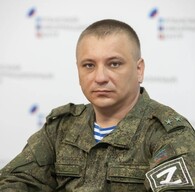LUGANSK, October 27 (Lugansk Media Centre) - Kiev representatives at the Contact Group political subgroup video conference on Tuesday refused to discuss the Donbass Republics’ road map for breaking the deadlock at the negotiations, LPR representative in the subgroup Rodion Miroshnik told the Lugansk Media Centre.
LPR representative at the Minsk talks, the Republic’s Foreign Minister Vladislav Deinego said after the Contact Group meeting on September 30 that to unblock progress on the political track, the Donbass Republics had “proposed to prepare a road map for fulfilling the whole package of the Minsk Agreements and submit it for consideration by the Ukrainian parliament.”
“During the talks, Ukraine refused to discuss the Republics-proposed road map as a compromise to break the deadlock at the negotiations,” Miroshkin said reminding that “the talks deadlocked after the Ukrainian parliament adopted a resolution on local elections which contained the norms that directly contradicted the Minsk Agreements.”
The LPR representative said that at the meeting of the working group on political issues on Tuesday, Ukrainian representative Alexander Merezhko said that he could not guarantee the fulfilment by the Ukrainian parliament of the accords reached at the Contact Group,”and that as a deputy, he could only initiate the consideration of this or that bill by the Verkhovnaya Rada (parliament) and that he could not secure the approval of legislation finalised by the parties.”
“This shows that no authority has been given the Ukrainian representatives at the talks by the Ukrainian parliament which has to pass a number of legal acts and amend the Ukrainian Constitution to fulfil the terms of the political settlement in accordance with the Minsk Agreements,” Miroshnik said.
Ukrainian negotiators were “unable to make the parliament revise the scandalous resolution on the elections, in the same way as they are not ready now to take the commitment on having the Verkhovnaya Rada approve “the road map,” he said.
Earlier, Donbass Republics representatives repeatedly said that holding local elections scheduled by the parliament contradicted the Minsk Agreements. Kiev refused to consider the cancellation of the parliament’s resolution; the October 25 elections were not held in the LPR, the DPR and even in several areas in the Ukraine-controlled part of Donbass.
Ukrainian government launched the so-called anti-terrorist operation against Donbass in April 2014. Conflict settlement relies on the Package of Measures for the Implementation of the Minsk Agreements, signed on February 12, 2015 in the Belarussian capital by the Contact Group members and coordinated by the Normandy Four heads of states (Russia, Germany, France and Ukraine). The UN Security Council approved the document by Resolution No 2202 of February 17, 2015 and called upon the parties to ensure its implementation.
The document provides for comprehensive ceasefire, withdrawal of all heavy weapons from the contact line, starting a dialog on reconstruction of social and economic ties between Kiev and Donbass. It also envisages carrying out constitutional reform in Ukraine providing for decentralization and adopting permanent legislation on a special status of certain areas of the Donetsk and Lugansk regions.
To facilitate the work of the Contact Group, four working groups were set up under its aegis to deal with issues of security, politics, return of internally displaced people and refuges, as well as with social, humanitarian, economic and rehabilitation issues.


